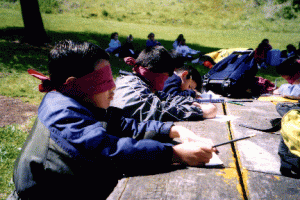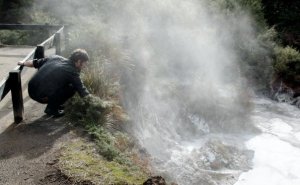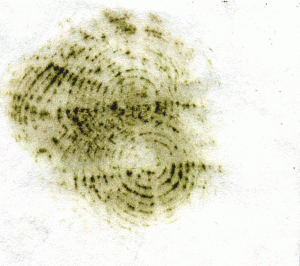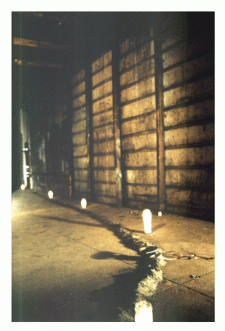Loren Chasse is an artist whom primarily works with natural settings, situations, and found objects as a form of spirited material that may be transported and recontextualised, revealing and altering our perception of space, objects and time. Chasse is Director of Education with the sound arts collective 23five and teaches in the San Francisco School District. He works with children to develop their sense of creative listening in both the field and classroom. Additionally, Chasse records and performs with the group’s idbattery, Thuja, Coelacant, the Blithe Sons, Of and the Child Readers and has a vast discography of published work.
………………
ER. I want to kick off by talking about the importance of education in your practice; can you elaborate on this element and how it feeds into your artistic output?
LC. My practice as an artist led me to the field of education and I feel fortunate that there’s this natural bridge between these two important parts of my life. I was asked to do a workshop for children years ago and found that I was really inspired (and quite challenged) to distil what I was doing to its essential parts, especially at a level where I could just about vanish as the ‘artist-personality’ behind the sound-making—where I would just be a teacher passing on ideas to eager children. They don’t care about who I am or what records I’ve released! In this setting, expectations are so different from a performance situation. It’s all about giving away just enough of what I do to stimulate exploration, invention, and experimentation on the part of the student—which ultimately, for me, is ‘the listener’. I began teaching workshops to children of all ages, mostly through public school programs, as well as some galleries and museums. I learned what it means to frame situations and provide enough tools and strategies so the listener might involve his/her own imagination, without me getting too specific or putting too much of myself into it, which ultimately inhibits the student. This is the difference between performing and teaching. I think for me there’s a little bit of one in the other, but there are distinctions that need to be preserved because the goals are not the same.
 Eventually, I became quite excited about education and decided to return to graduate school to obtain a teaching credential. Now that I’ve been teaching primary school (all academic subjects) for seven years, I’ve grown quite sensitive to the ways children listen. Playing with sound is still a big part of the experience of being in my classroom, but I use it more as a way to provide a break from the academic routine. I do use it to stimulate writing, drawing, and language development—as a means for prompting creativity. It’s satisfying for me to observe children listening wilfully and with wonder rather than because they are told to do so by their teacher. Active listening is a delicate communication skill that requires nurturing over time.
Eventually, I became quite excited about education and decided to return to graduate school to obtain a teaching credential. Now that I’ve been teaching primary school (all academic subjects) for seven years, I’ve grown quite sensitive to the ways children listen. Playing with sound is still a big part of the experience of being in my classroom, but I use it more as a way to provide a break from the academic routine. I do use it to stimulate writing, drawing, and language development—as a means for prompting creativity. It’s satisfying for me to observe children listening wilfully and with wonder rather than because they are told to do so by their teacher. Active listening is a delicate communication skill that requires nurturing over time.
ER. Do you find that spending time with, and educating children on sound and listening has broadened your own understanding of your environment and surroundings?
JC. Certainly my work as an educator has influenced the way I listen and perform. Sound is a field of information but not one that we are deliberately brought up to ‘read’. In my classroom I regard sound and listening as a component of literacy. Much of being literate has to do with the ability to be playful with language, to break its rules even (but knowingly). A big part of this is subjectivity—all the experiences and references the listener brings to the sound. I’ve never really be interested in documenting sonic phenomena or environments in my work, that is, in presenting something objective that frames the listener’s experience and tells them what is going on and what it means. Certainly, there’s great value in objectively recording and listening to sound, especially as a means for knowledge in fields like zoology, sociology, ethnography, meteorology, engineering, and so on.

ER. What are some of your most memorable recording experiences and sonic memories in general?
LC. I’d have to go back to those formative years when I was a kid: fundamental noises like rain on the tent or the awning of the front porch; wind in the branches of the sycamore tree where I had a tree house. One that still runs deep for me is the hiss and sputter of sprinklers on a lawn. A massive influence on my ear was my grandfather DJing classical music from his 1/8 in. reels and 78s– Shostakovich, Ravel, Tchaikovsky, and Sibelius–all throughout my childhood. The dust and crackle from the records was so much a part of the music. My grandfather played harmonica and, in fact, his father was President of the Hohner Company in the States. I did a lot of camping with my father too as a kid and so my sensitivity to the natural world was nurtured from early on. I remember wearing garbage bags in the rain while hiking in these dense lush forests in New York State. And then the campfire come nighttimes was almost holy. I am fortunate to have grown up on the periphery of rural Pennsylvania, with lots of family trips into New England and to the Jersey seashore—to have had my ears conditioned by night insects and the ambience of thunderstorms and that strange acoustic blanket of snowfall, where the world seems most nearly silent. My mother had dulcimers, guitars, a piano, and lots of percussion instruments around the house and often played John Denver and Judy Collins songs. And at my father’s house, the walls were covered with old zithers, banjos, violins…most of them broken, which was perfect for me because there weren’t really any ‘rules’ about how to properly handle an instrument! As far as recording experiences go, I’d have to say that most are memorable as I so rarely record in the same place twice. My records, for me, are very autobiographical, journal-like: most tracks reference a specific time, place and situation. I find that the sounds evoke details of the original experience that memory on its own might not retain.
 ER. Can you remember when sound became an important and active focus in your life and how that came about?
ER. Can you remember when sound became an important and active focus in your life and how that came about?
LC. Deliberately playing with sound began with a toy I got as a present from my mom one year called The Sound Gizmo. It was this blue and orange wand with some knobs and slides and a big speaker at the end. I remember the first time I dug it out of the closet when I was in high school and put it by my drum set. So I think already then, I was getting bored just being a ‘drummer’! Once I moved to San Francisco and was taught how to make a contact mic by a friend, I realized a new potential for the drums and eventually reached a point where I found I didn’t really need them at all (influenced also by no longer being able to afford a practice space). There are these fundamental steps in the path away from conventional music making toward what might be truly called ‘experimental music’ (when there are actual experiments, unknown outcomes and risks of failure). I think the contact mic teaches us that anything may become an instrument, which is an exciting discovery for naïve ears. It’s humbling when I watch my students rather effortlessly ‘discover’ things about sound making that took me years to get to! Of course, they’ve got a teacher giving them little nudges in that direction.
ER. What is the significance of the sense ‘touch’ in your practice?
LC. Touching is a way to get to know a material and the way it behaves, what its nature is. There are conventional ways for touching things, following the ‘rules’ according to need, function, use, etc… And there is that touching that is purposeless (or that redirects the purpose, such as plucking the wires of a fence or thumping radiator pipes for the purpose of eliciting a sound). An active use of hands is important to me because I like very physical sounds and it I find that I often ‘touch’ an object or a material quite hyperactively in order to amplify the physical experience, even if the sound itself is quite small. Metaphorically, ‘touch’ refers to the experience of a listener being ‘touched’ by sound. I like the experience of sound coming directly to the ear from its source, without mediation. This can be actual and it’s something I like to explore in performance situations, the intimacy of treating each listener’s ear to a unique experience. I also like the illusion of sound spilling from the speakers onto the floor, so to speak. Sometimes the nature of the sound is enough to transcend the container/vehicle and other times the recording and mixing style can produce this effect (with a nod to the virtues of cassette recording!)
ER. Your work navigates the idea of ‘animism’ or of an object containing a soul. How do you go about evoking this inanimate life and how do you effectively communicate it to the listener? Is it a poetical device rather than a practical concern?
LC. I’ve always enjoyed exploring abandoned places. As a kid, I spent weekends in the countryside of Pennsylvania – small towns with old farms, collapsing sheds and barns, crumbling foundations in the woods and meadows on the outskirts. As I grew up and moved into more urban places, there were the old factories and industrial zones. The objects found in such places contain histories of human activity, of individual hands having touched them for various purposes, in specific contexts. Not so much about ‘ghosts’, but rather ‘the ghosts of human actions’. I think about this when I pick up a chunk of masonry or an old machine part and use it to make a sound. This object was once warm with another person’s touch. I like to animate sound with my own hands, as opposed to documenting/recording what is already happening, more or less independent of me. I’ve communicated this through some of the texts I include with my records, which are mostly poetic and personal. This message is not so important for the listener but I hope that it will only stimulate the imagination a bit more. Perhaps the practical part of it is that I would like to think my work has the effect of encouraging some sensitivity around the way people listen. In my classroom, I am always trying new ways to get my students to listen wilfully and with some wonder. After all, as passive as listening feels to us, it is at least half of the communication process and so it’s quite important that we do it well.

ER. Can you talk a little about your Otic Diaries and where they fit into your practice?
LC. The ‘Otic Diaries’ part of my work (‘otic’ is a root meaning having to do with the ear. I like to think of the word ‘psychotic’, where the mind is in a perplexed situation of hearing voices) was just my way for considering and naming all the personal experience around sound making, recording and performing. So the ‘diaries’ manifested in some writing, drawings, photos, and most of all, a series of rubbings on paper that are meant to be graphic documents of the materials and the actual gestures that would often go into my sound-making. In a situation where I’d find myself scattering pebbles in a puddle of water because I liked the sound of it, I would also treat a piece of paper with that water and drop pebbles on it, leaving behind marks. I wrote a short piece subtitled ‘records of touching’, which was about the process of making these rubbings and how they represent my relationship to the world I get caught up listening to. I also started using ‘Otic Diaries’ (followed by a specific place and date) to name performances for a while. This was at a time when I was doing a lot of private actions for members of the audience. I had wanted to do something like this for years but was never quite sure how to pull it off, practically and conceptually, whilst not seeming too ‘gimmicky’.
ER. How then, did you eventually realise this aspect of your work in a live performative situation?
LC. Eventually, I realized how it could work as a stage of the performance, once I had sounds already blanketing the room I could tiptoe around and visit each listener. I’m really interested in this aspect of performing, that is, the individual experiences of the listeners, where they are physically in the room as well as what expectations and experiences they bring to the performance that influence how they hear. I can imagine another ‘diary’ at some point, reflections on all funny moments where I’ve produced a giggle or a sigh or try someone’s patience as I’d delicately try to extricate a teazle (this is a barbed thistle-like pod I often use as a sound maker) from her hair. Once, a man reached into his large duffel bag while I was rubbing two stones beside his ear, and took out a bottle of prescription pills, percoset I think, and put it in my pocket. At the end of the performance, he came up to me and asked if that could count as trade for a cd!
ER. In processing or manipulating real/exterior recordings what do you want to achieve?
LC. Through reorganizing the time component in recordings, layering, isolating and focusing/blurring frequencies, I think what I’m after is producing an effect that is slightly disorienting for the listener. The sounds evoke something familiar yet the context is nebulous and so the imagination is freed up a bit. When we are not told what we are looking at, tasting, touching, or listening to, then there is some freedom granted to our perceptual processing. I remember this game around Halloween season as a kid where you’d be blindfolded and would have to sink your hands into a bowl of something ‘wet’, ‘slimy’, ‘oozy’, ‘disgusting’, ‘coiled’, ‘slithery’, ‘gross’, ‘like guts’, all this sensual experience stirred up because you weren’t told you were merely ‘touching cold spaghetti’. It’s like this with sound too.

ER. How important is it that your work is ‘felt’ rather than understood?
LC. I don’t really care if a listener gets what I get out of a listening experience. I have my specific reasons for choosing certain source materials, recording in certain locations, making compositional choices, yet there’s really nothing for a listener to understand. It’s true that it’s really about a feeling, a message sent to and for the ear and not the brain, perhaps?
ER. You’re an incredibly productive artist, what have you got in the pipeline?
I’ve been doing less and less lately. I have ongoing projects that still hold my interest and that I am finishing up, but I must admit, I haven’t been all that inspired to do much more than listen to the world around me. I’m burning out on making field recordings (especially on cataloguing them!) and I think that maybe all the creative work I’ve done with sound has really just led me to a place in my life where I am content just listening for the sake of listening. I realize more and more that there is something in the direct experience that cannot be represented. I have been enjoying my collaborations with Keith Evans (sound, installation, film) under the name Chresmologues and see some momentum here. Also, my solo work as Of keeps drawing me towards more ‘proper’ music making. A friend of mine just made me a beautiful dulcimer (the ‘Krulcimer’) so I imagine I’ll just play this for a while and develop my skills. Ultimately, I think I just want to play drums in a band again. I’ve been playing daily and feeling a freshness in the choices I’m making behind the kit.
ER. And finally as always, Ear Room asks, what does the term sound art mean to you?
LC. It doesn’t really mean all that much to me, yet it’s helpful to have some term ready when I find myself cornered into discussions about music and musicianship. There’s often contempt for this term among the artists it’s used to describe. I think this is because of the associations with the Art Establishment, the appropriation of this tag by the MOMAs of the world and the all the scrambling for grants, commissions, residencies, and overall, the recognition and validation coming from a place that ‘sound art’, with all its DIY (anti-Establishment/punk origins), would historically and by nature reject. There’s just a lot of tension here because, after all, wouldn’t everyone just like to be supported full-time as an artist? Yet in making the certain ‘moves’ that are required to get this recognition, often the impulses in an artist that are truly forward-thinking or ‘experimental’ need to be tamed. Art has so many different goals. It might be to influence perception, or to represent one thing with another, or to tell a story, or to stimulate an emotional response, or to indicate some sort of meaning through a relationship, and certainly it can be a combination of these. So it’s hard to pin down what makes sound ‘art’. Generally though, this term seems to refer to the use of sound for purposes other than musical, where the listening experience is framed differently than it would be for a musical event.
FIN
Download printable version [here]